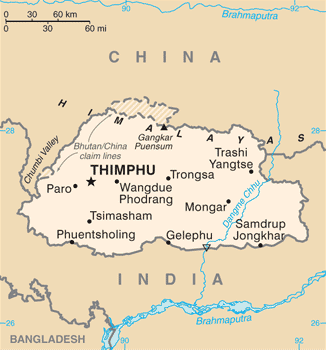Bhutan–China relations
This article may be expanded with text translated from the corresponding article in Chinese. (June 2021) Click [show] for important translation instructions.
|
 | |
China |
Bhutan |
|---|---|
The Kingdom of Bhutan and the People's Republic of China do not maintain official diplomatic relations, and relations are historically tense.[1][2][3] The PRC shares a contiguous border of 470 kilometers with Bhutan and its territorial disputes with Bhutan have been a source of potential conflict. Since the 1980s, the two governments have conducted regular talks on border and security issues aimed at reducing tensions.[1][2][3]
Background[]
Bhutan has long had strong cultural, historical, religious and economic connections to Tibet. Relations with Tibet were strained when China took over Tibet in 1950s. Unlike Tibet, Bhutan had no history of being under the suzerainty of China nor being under British suzerainty during the British Raj.
Bhutan's border with Tibet has never been officially recognized, much less demarcated. The Republic of China officially maintains a territorial claim on parts of Bhutan to this day.[4] The territorial claim was maintained by the People's Republic of China after the Chinese Communist Party took control of mainland China in the Chinese Civil War. With the increase in soldiers on the Chinese side of the Sino-Bhutanese border after the 17-point agreement between the Tibetan government and the central government of the PRC, Bhutan withdrew its representative from Lhasa.[4][5][6]
The 1959 Tibetan uprising and the 14th Dalai Lama's arrival in neighboring India made the security of Bhutan's border with China a necessity for Bhutan. An estimated 6,000 Tibetans fled to Bhutan and were granted asylum, although Bhutan subsequently closed its border to China, fearing more refugees.[4][7]
Border issues[]

See also[]
- Bhutan–India relations
- List of territorial disputes#Asia
References[]
- ^ a b A New Bhutan Calling (14 May 2008). OutlookIndia.com. Accessed 30 May 2008.
- ^ a b "Bhutan-China Relations". Bhutannewsonline.com. 5 July 2004. Archived from the original on 27 December 2009. Retrieved 30 May 2008.
- ^ a b Hussain, Wasbir (May 2007). "India and the upcoming Druk democracy". Himal Southasian. Archived from the original on 13 January 2008. Retrieved 30 May 2008.
- ^ a b c Savada, Andrea Matles (September 1991). Nepal and Bhutan : country studies. Library of Congress. pp. 330–333. ISBN 0844407771. Retrieved 30 May 2008.
- ^ Balaji, Mohan (12 January 2008). "In Bhutan, China and India collide". Asia Times Online. Archived from the original on 9 May 2008. Retrieved 30 May 2008.CS1 maint: unfit URL (link)
- ^ M Shamsur Rabb Khan (8 April 2008). "Elections in the Himalayan Kingdom: New Dawn of India-Bhutan Relations". Institute of Peace & Conflict Studies. Retrieved 29 May 2008.
- ^ Bhutan: a land frozen in time (9 February 1998). BBC. Accessed 30 May 2008.
- Bhutan–China relations
- Bilateral relations of Bhutan
- Bilateral relations of China

